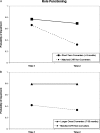Risk factors for psychosis: impaired social and role functioning
- PMID: 22080497
- PMCID: PMC3494064
- DOI: 10.1093/schbul/sbr136
Risk factors for psychosis: impaired social and role functioning
Abstract
Objectives: Risk for psychosis is currently defined primarily on the basis of attenuated positive symptoms (APS), with no inclusion of the functional deficits characteristic of schizophrenia. Impaired social and role functioning have been of interest for reflecting poor outcome but far less is known about the developmental impact of these deficits as vulnerability or risk factors.
Methods: Age-appropriate social and role functioning were prospectively assessed in 100 individuals at clinical high risk (CHR) for psychosis included in the 8-site North American Prodromal Longitudinal Study database. A nested case-control design was used to compare changes in social and role functioning in 26 individuals converting to psychosis shortly after baseline assessment and 24 converting over a year later. Individuals in each converter subgroup were directly matched to a non-converter at the same site, controlling for time to conversion, age, gender, and severity of baseline symptoms.
Results: At baseline, CHR subjects who later became psychotic were significantly more likely to be impaired socially than matched non-converters. Onset of psychosis did not further disrupt social difficulties. Role functioning showed some of the same trends, but the overall pattern was not as consistent as for the social domain. Controlling for neurocognition did not change the pattern of group differences.
Conclusions: Early impaired social functioning appears to be a risk factor for psychosis and, added to APS, could potentially contribute to accurate identification of CHR individuals and provide a new direction for early intervention to reduce long-term disability.
Figures



References
-
- Cornblatt B, Lencz T, Smith C, Auther A. Treatment of the schizophrenia prodrome. In: Tsuang MT, Stone WS, Lyons MJ, editors. Recognition and Prevention of Major Mental and Substance Use Disorders. 1st ed. Washington, DC: American Psychiatric Publishing; 2007. pp. 159–185.
-
- Carpenter WT, Jr., Heinrichs DW, Wagman AM. Deficit and nondeficit forms of schizophrenia: the concept. Am J Psychiatry. 1988;145:578–583. - PubMed
-
- Green MF, Kern RS, Braff DL, Mintz J. Neurocognitive deficits and functional outcome in schizophrenia: are we measuring the “right stuff”? Schizophr Bull. 2000;26:119–136. - PubMed
-
- Hamilton SH, Edgell ET, Revicki DA, Breier A. Functional outcomes in schizophrenia: a comparison of olanzapine and haloperidol in a European sample. Int Clin Psychopharmacol. 2000;15:245–255. - PubMed
Publication types
MeSH terms
Grants and funding
- K24 MH76191/MH/NIMH NIH HHS/United States
- R18 MH43518/MH/NIMH NIH HHS/United States
- U01 MH081928/MH/NIMH NIH HHS/United States
- R01 MH062066/MH/NIMH NIH HHS/United States
- R41 MH083436/MH/NIMH NIH HHS/United States
- P50 MH064065/MH/NIMH NIH HHS/United States
- R01 MH061523/MH/NIMH NIH HHS/United States
- U01 MH066134/MH/NIMH NIH HHS/United States
- U01 MH081857/MH/NIMH NIH HHS/United States
- P50 MH080272/MH/NIMH NIH HHS/United States
- R18 MH 43518/MH/NIMH NIH HHS/United States
- U01 MH74356/MH/NIMH NIH HHS/United States
- U01 MH082004/MH/NIMH NIH HHS/United States
- 5U01 MH081988/MH/NIMH NIH HHS/United States
- U01 MH082022/MH/NIMH NIH HHS/United States
- R01 MH60720/MH/NIMH NIH HHS/United States
- K23 MH001905/MH/NIMH NIH HHS/United States
- U01 MH066069/MH/NIMH NIH HHS/United States
- R01 MH65079/MH/NIMH NIH HHS/United States
- K05 MH01654/MH/NIMH NIH HHS/United States
LinkOut - more resources
Full Text Sources
Other Literature Sources
Medical
Miscellaneous

